13 Foods That Make Your Skin Worse, According to Dermatologists

No matter how well you wash your face at night or how many products you use to ensure that your skin maintains that youthful, wrinkle-free glow for as long as possible, nothing has the power to impact how your skin looks quite as much as what you eat. And while it's common knowledge that foods packed with collagen and antioxidants can make your skin look and feel younger, there are also foods you should avoid if you're looking to keep wrinkles, age spots, acne, and other skin issues at bay.
With that in mind, we talked to several dermatologists and asked them to name foods that can cause or exacerbate skin issues. "Many factors contribute to the development of wrinkles, acne, dryness, and general changes to our skin textures. Some of these factors include diet, dairy products, sugars, chocolates, fast foods and alcohol," explains cosmetic dermatologist Dr. Michele Green.
Though there is still research to be done, numerous studies have established the link between acne and certain foods. "Diet and acne have been controversial, but recent research shows that diet can play a significant role in acne development. People with acne tend to consume more refined carbohydrates than people with little or no acne," Green adds. "Foods rich in refined carbohydrates include bread, crackers, cereal, pasta (all made with white flour), white rice, noodles, sodas, sweetened beverages, cane sugar, maple syrup, and honey or agave."
Similarly, we know that alcohol consumption can dehydrate the skin (making it appear dry) and consuming too much sugar can cause wrinkles.
Keep reading to find out which foods you should avoid if you want your skin to be as healthy as possible, and for more on healthy eating, don't miss 7 Healthiest Foods to Eat Right Now.
Fatty Meat
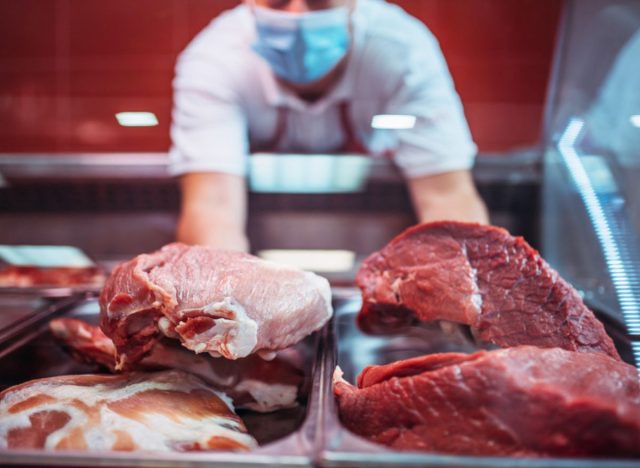
"When working on your diet, it is important to make sure you are getting the best foods for your health. When it comes to meats, a lot are high in saturated fats," explains Green. Fatty cuts of meat such as short ribs, which are high in saturated fat, are associated with high concentrations of insulin growth factor. The insulin growth factor stimulates the production of the sex hormones that can increase acne production. If meat is an integral part of your diet, Green suggests opting for lean cuts with very little fat. "The key with meat is to keep it lean. Tenderloin cuts tend to be leaner. Look for ground beef that is at least 95% lean," she advises. "Ground turkey breast and chicken breast are other lean options."
Bacon, Hotdogs and Pepperoni
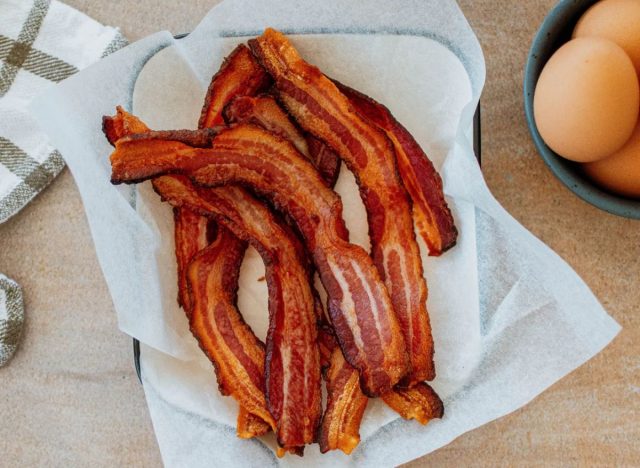
"These meats are high in nitrates and should be avoided, as nitrates can damage the skin by causing inflammation and wrinkles," says Dr. Howard Sobel, founder of Sobel Skin and attending dermatologist and dermatologic surgeon at Lenox Hill Hospital in New York City. "Processed meats can also contain high levels of sodium, which can dry your skin out and weaken collagen production."
Foods With a High Glycemic Index
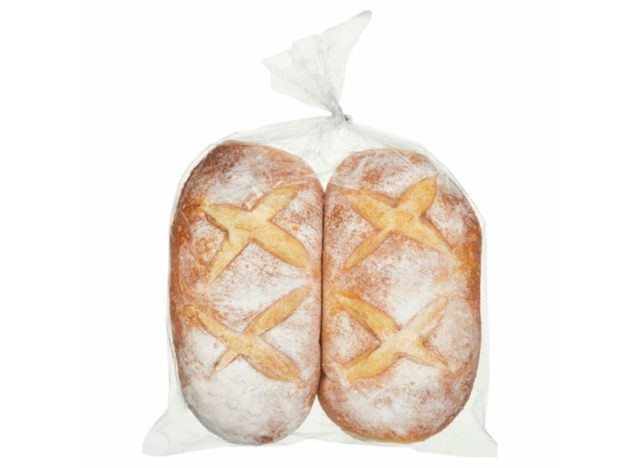
High glycemic foods, such as white bread, white pasta, and potatoes, can wreak havoc on your skin, according to New York City dermatologist Dr. Joshua Zeichner. "Foods with a high glycemic index not only cause acne breakouts, but also may be associated with premature aging," he says. "High blood sugar levels (which can be triggered by foods with a high glycemic index) leads to a process called glycation, where sugar molecules attach to collagen in the skin. This causes collagen to harden, so it breaks rather than bends, leading to wrinkles and a crepey appearance. Stick to whole grains rather than processed flour."
If you want to keep your skin looking younger, ditch the bread and load up on these 25 Healthy Foods That Fight Aging, According to Dermatologists.
And Artificial Sweeteners
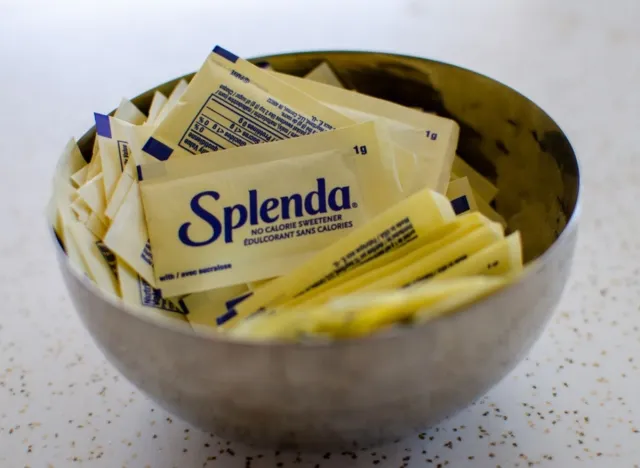
As New York City-based dermatologist Dr. Hadley King explains, even foods that are artificially sweetened, such as soft drinks, pasta sauce and juices, can create problems for your skin. "Artificial sweeteners have been shown to be able to affect our hormones in the same way as sugar, so therefore they may also contribute to acne," she notes. "Also, excess sugar molecules bond to collagen and elastin through a process named glycation, resulting in AGEs, or advanced glycation end products. This process ultimately causes the collagen and elastin fibers to lose their strength and flexibility, contributing to the aging of the skin. These cross-linked proteins known as AGEs have been shown to be directly related to loss of elasticity and firmness in the skin."
Dairy Milk and Dairy Milk Products
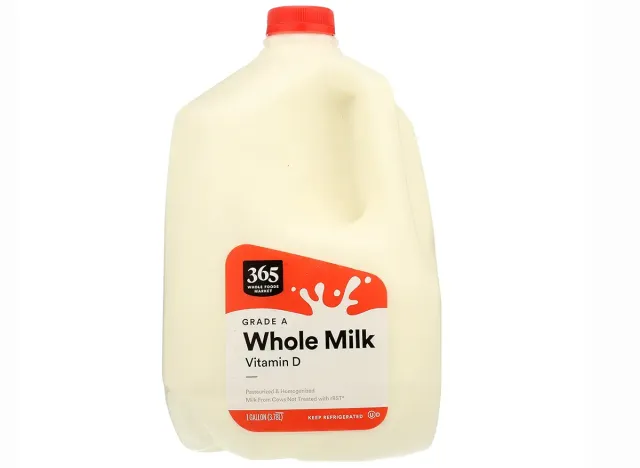
"Studies looking at teens and milk consumption show a correlation with acne," says Diane Madfes, MD, FAAD and assistant professor of dermatology at the Mount Sinai School of Medicine. "Cow's milk elevates insulin levels and some brands even have growth hormones. Elevated insulin increases circulating cortisol levels that bind to our sebaceous glands, increasing sebum production. Milk will not give acne but may unveil an underlying genetic predisposition."
Since cow's milk has been linked to skin issues, the same is true for dairy products made using cow's milk, like certain types of cheese, ice cream and more. "Almond milk is a good alternative," adds Madfes. As are these Milk Alternatives 101: Your Guide To Every Dairy-Free Milk Substitute.
Whey Protein
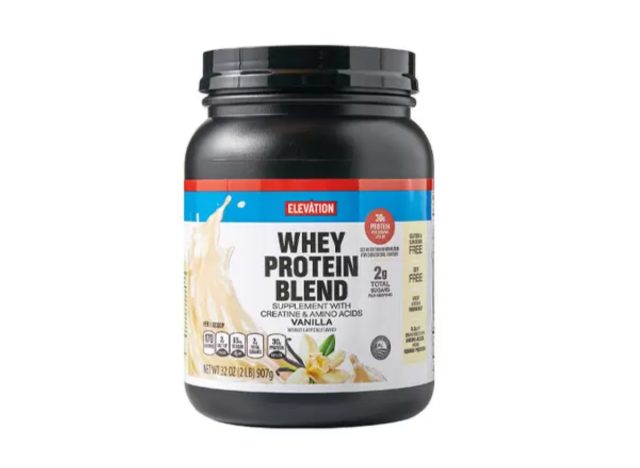
While whey protein is found in dairy milk, it can also be consumed as part of other foods such as shakes or smoothie bowls. "Whey protein consumed by bodybuilders has also been associated with more acne breakouts," says Dr. Yoram Harth, a board-certified dermatologist and the medical director of MDacne. As explained above, whey protein can cause acne because it increases the production of a hormone called insulin-like growth factor 1, or IGF-1. In turn, insulin increases the production of sebum, which is associated with the development of acne. "An excellent alternative to regular whey protein is a vegan, plant-based protein powder," Harth adds. Try these The Best Vegan Protein Powders for Your Muscle-Building Needs.
Alcohol

"Alcohol has the ability to speed up the aging process and cause changes to skin's texture, especially in females if it is not consumed moderately. This is because alcohol acts as a diuretic, it draws out liquid from the body," Green notes. "Less fluid can lead to dehydration and take away moisture from the skin, contributing to dryness. This can make fine lines and wrinkles appear more pronounced."
Though this applies to all types of alcohol, such as wine, beer, champagne, and vodka, Green points out that the occasional drink is fine. "Moderate drinking is one drink per day for women (such as a 5-ounce glass of wine or 12-ounce glass of beer) and two drinks for men," she says.
Fast Food
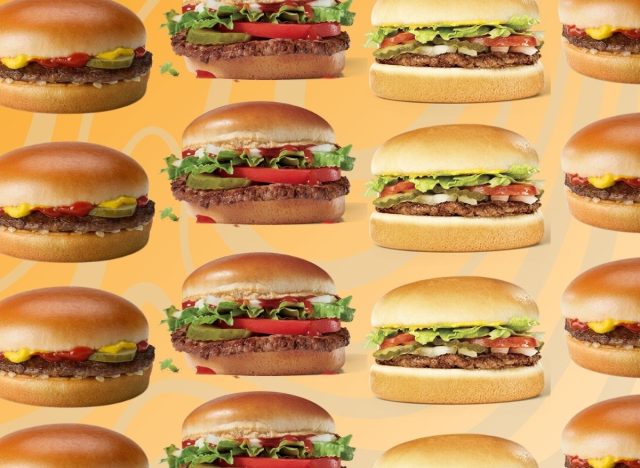
"Acne is strongly associated with eating a Western-style diet rich in calories, fat and refined carbohydrates," says Green. "Fast food items, such as burgers, nuggets, hot dogs, French fries, sodas, and milkshakes are mainstays of a typical Western diet and may increase acne risk."
Related: Dangerous Side Effects of Eating Fast Food Every Day, According to Science
Potato Chips and French Fries
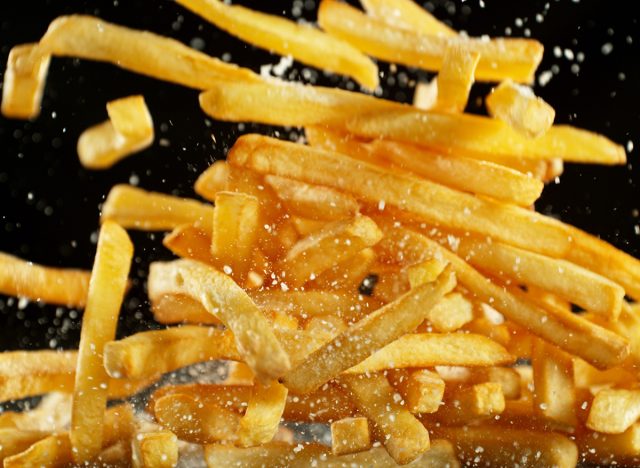
Like fast food, these fried foods should be avoided if you want your skin to look as youthful as possible. "These foods are notoriously fried in lots of oils that cause inflammation throughout the body, including the skin," Sobel explains. "They are also filled with refined carbs, which cause inflammation, leading to wrinkles and premature, aged-looking skin."
Spicy Foods
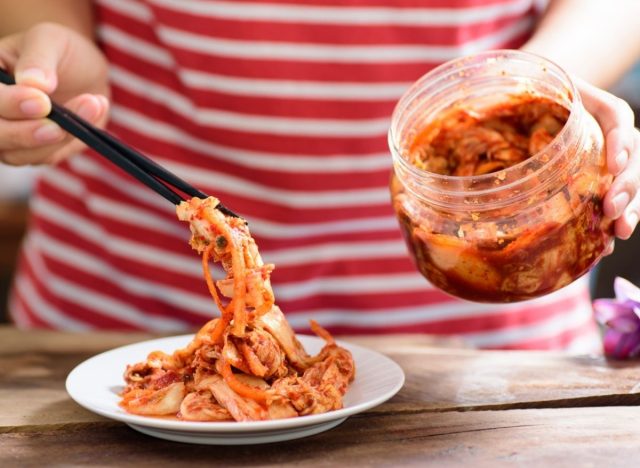
As it turns out, foods that have a little kick to them can do more than just make your face turn red. "Spicy foods like salsa, hot sauce and chili peppers trigger rosacea, another inflammatory process," notes Madfes. "The inflammatory cascade causes dilation of blood vessels, increased sebum production and skin sensitivity. Rosacea runs the spectrum of flushing, breaking out and cysts to nose swelling."
Chocolate
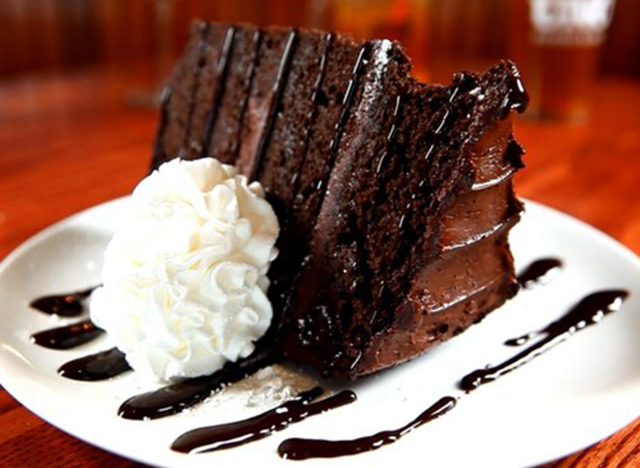
"Chocolate has also been found to increase the chances of acne flare-ups," Green explains. "Your body metabolizes these carbs the same way as sugar, meaning they can also cause wrinkles by damaging the collagen in your skin. A diet high in fat and refined sugars, like those found in candy and chocolate, can kick sebum production into high gear and trigger inflammatory responses in the body, both of which are known to increase the risk of breakouts."
Soda
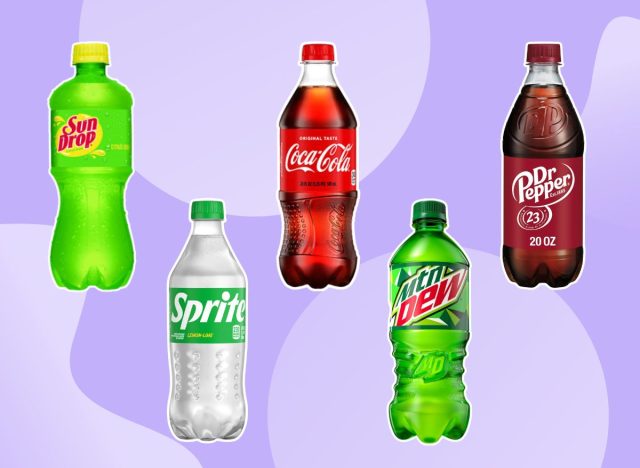
"This sugary beverage can damage your collagen supply, leading to sagging skin," says Sobel. "Soda also contains phosphates and when these levels are increased, they thin the skin and cause early aging – i.e., wrinkles."
Baked Goods
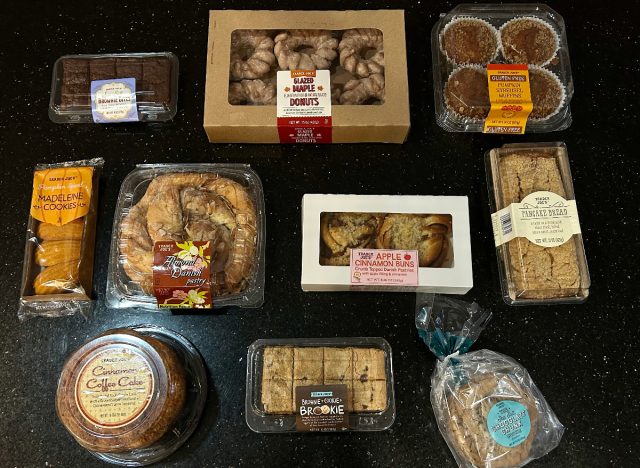
As tasty as they may be, baked goods are often loaded with trans fat, which can have a negative impact on your skin and overall health. "Especially avoid trans fats, they can raise your 'bad' cholesterol and lower 'good' cholesterol, which increases your risk for heart disease," notes Green. "Having too much sugar and processed carbohydrates (like bread and baked goods) can lead to damage in your skin's collagen, which keeps your skin springy and resists wrinkles."
She adds: "Doughnuts and sugary pastries sound delicious however, they are packed with sugar, which may be linked to the development of wrinkles." Your skin isn't the only thing at risk when you eat too much sugar. See: What Eating Added Sugars Does to Your Body.








